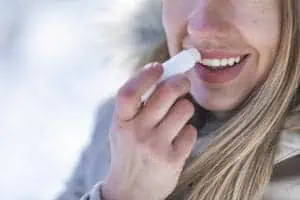
If you ski or spend time in the snow or the sun, you’ve probably experienced chapped lips, which doctors refer to as cheilitis. They can be as uncomfortable as they are unsightly. In the case of severely chapped lips, cracks and sores may develop, and the lips may even bleed.
In most cases, a few simple changes to your daily habits and lip care routine will treat the chapping and give you back the soft, smooth, healthy lips nature intended
Chapped lips causes
Lips are especially vulnerable to dryness and inflammation because they lack oil glands. The following factors can push the dryness over the edge and lead to chapping.
- Wind and cold weather. Frigid temperatures, low humidity and wind, especially when combined, can deplete moisture from the lips, leaving them flaky, scaly or swollen.
- Sun exposure. Lips are especially sensitive to ultraviolet (UV) rays because the layer of skin that covers them is thin and contains little melanin, the pigment that helps protect skin from the sun. Years of sun damage can cause a precancerous condition called actinic cheilitis, which may look like extremely chapped lips. In addition to dryness and cracking, signs include swelling and redness or white patches, usually on the lower lip. Over time the patches may become scaly and rough. In some cases, the border separating the lower lip from the skin below it becomes less distinct.
- Licking your lips. It’s tempting to do this when your lips feel parched, but it’s counterproductive. While a coating of saliva on dry lips may bring temporary relief, the saliva evaporates quickly, taking moisture with it and leaving lips drier than before.
- Certain medications and supplements. Chapped lips are a common side effect of topical retinoids such as Retina-A, vitamin A supplements and lithium, a medication used to treat bipolar disorder. Chemotherapy also can cause lips to become dry and chapped.
- Dehydration and diet. Chapped lips could be a sign of dehydration, or a diet that’s lacking critical nutrients, including B vitamins, zinc and iron.
- Excess saliva. If saliva collects in the corners of the mouth due to factors such as wearing braces or poorly fitting dentures or having a misaligned bite, the saliva can irritate the skin. What’s more, yeast and bacteria can flourish, causing reddish, inflamed, possibly crusty patches on the skin at the corners of the lips. This painful condition is called angular cheilitis. A deficiency of iron or vitamin B2 (riboflavin) is another possible culprit. Licking the lips makes the condition worse.
- The wrong balm or lipstick. Some products irritate the lips, making chapped lips more likely. The American Academy of Dermatology (AAD) advises steering clear of products that contain camphor, eucalyptus, fragrance, flavoring (such as citrus, mint or cinnamon), lanolin, menthol, octinoxate or oxybenzone, phenol (or phenyl), propyl gallate or salicylic acid.
Chapped lips remedies
For most people, using a good lip balm or ointment is the fastest route to healing chapped lips. Choose one labeled “fragrance free” and “hypoallergenic.” Look for at least one of these ingredients recommend by the AAD:
- Castor seed oil
- Ceramides
- Dimethicone
- Hemp seed oil
- Mineral oil
- Petrolatum
- Shea butter
- White petroleum jelly
For extremely chapped lips, the AAD recommends using an ointment that contains white petroleum jelly. Ointments are more effective at sealing in moisture than waxes or oils. Don’t use any lip balm that makes your lips tingle, sting or burn. If you find that your lip product dries out your lips, choose a different product.
When you’re outdoors, no matter the season, use a lip balm with SPF 30 or above that contains titanium oxide or zinc oxide, and reapply it every couple of hours. In the winter, cover your mouth with a scarf, ski mask or face gator to protect your face and lips from the elements.
Indoors, running a humidifier can help keep your lips hydrated. Run it in the room where you spend the most time.
Drink plenty of water throughout the day to keep your lips, and the rest of your body, hydrated. Avoid licking, biting or picking at your lips.
If these steps don’t resolve the problem, see a skincare provider. All cases of actinic cheilitis should be treated by a dermatologist to reduce the risk that the patches will become cancerous. People with angular cheilitis may also need a doctor’s care.
Article Written By: Jessica Brown is a health and science writer/editor based in Brooklyn, New York. Her work has appeared in Prevention, Johnson & Johnson, the Breast Cancer Research Foundation and many more.





